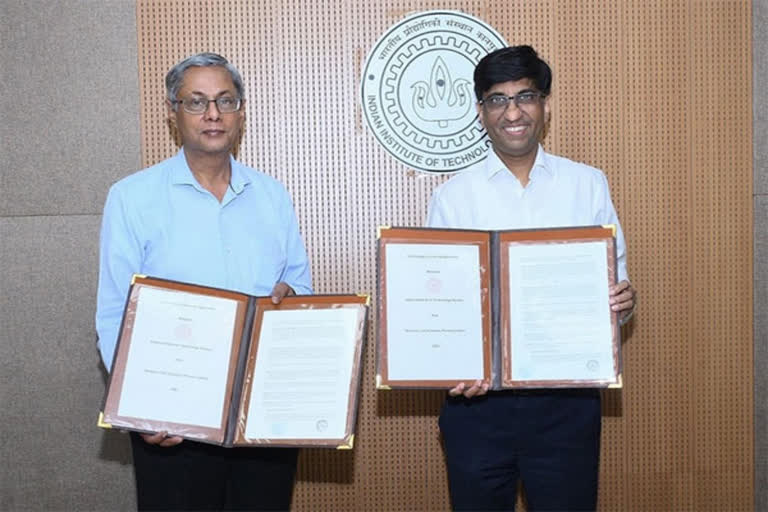Kanpur (Uttar Pradesh): In a historic moment, the Indian Institute of Technology (IIT) Kanpur has licensed a pioneering technology to Reliance Life Sciences Pvt Ltd that has the potential to revolutionize the field of gene therapy, especially for many genetic eye diseases. There are many inherited disorders caused by faulty genes.
According to a statement by IIT Kanpur, gene therapy is a way to replace the faulty gene with a functional version of the gene to treat such disorders. This marks the first time that a gene therapy-related technology has been developed and transferred from an academic institution to a company in India.
The gene therapy technology from IIT Kanpur will be further developed as an Indigenous Product by Reliance Life Sciences. The technology licensing agreement was formally signed today between IIT Kanpur and Reliance Life Sciences Pvt Ltd at an MoU exchange ceremony in the presence of several dignitaries, including IIT Kanpur Director Prof Abhay Karandikar and Reliance Life Sciences President KV Subramaniam.
Others present on the occasion included Prof Ankush Sharma (PIC, Innovation and Incubation), Prof Amitabha Bandyopadhyay (Head, BSBE Department), Prof. Jayandharan Giridhara Rao (Dept. of BSBE) of IIT Kanpur) and Venkat Ramana (CSO) and Praveen Sharma (General Manager) of Reliance Life Sciences.
Developed by Prof Jayandharan Giridhara Rao and Shubham Maurya from the Department of Biological Sciences and Bioengineering (BSBE), IIT Kanpur, the patented technology modifies the gene of an organism to treat a hereditary disorder. In this case, the site refers to a specific location on an Adeno-associated virus (AAV) (viral vector) used for gene therapy.
The technology modifies this location to optimize its ability to deliver genes to the affected cells and improve its effectiveness. The technology has the ability to improve gene therapy for many hereditary diseases, especially inherited eye diseases. It has shown significant promise in correcting vision impairment in animal models of blindness.
Gene therapy is one of the most potent applications of recombinant DNA technology wherein pieces of DNA from multiple sources are combined to efficiently deliver the healthy copy of the faulty gene in a manner that production of protein from the introduced gene is sustained for life. To enable this, the therapeutic DNA molecule is delivered using a virus that can infect human cells.
For successful clinical application, several optimization of the basic process is needed aimed at ensuring the adequate expression of the desired gene. "IIT Kanpur is committed to developing impactful technologies in the field of healthcare, and we are delighted to see the licensing of this gene therapy technology to Reliance Life Sciences," said Prof Abhay Karandikar.
"Gene therapy using viral vectors has recently emerged as a potent tool in the field of molecular medicine. We believe that this technology holds great promise for treating a wide range of hereditary eye diseases including Leber congenital amaurosis, an eye disorder that is present from birth; and Retinitis pigmentosa, a disease-causing progressive sustained vision loss. At IIT Kanpur, we foresee several such impactful technologies being developed in the near future for many such genetic disorders and are excited to see the impact that it will have in the coming years. We have recently established the Mehta Family Centre for Engineering in Medicine at IIT Kanpur to pursue such areas of research," added the IIT Kanpur Director.
Reliance Life Sciences President KV Subramaniam, said "We are pleased to have the opportunity to work with IIT Kanpur to further develop this important technology, Reliance Life Sciences is a research-driven, medical biotechnology company and we are thrilled to collaborate and take forward this innovative technology to commercialisation."
Reliance Life Sciences is developing several gene therapies to address unmet clinical needs. In addition to gene therapies, Reliance Life Sciences is developing a range of human and animal health vaccines and mRNA products. Gene and cell therapies represent a new and innovative stream of products, aimed to reinforce Reliance Life Sciences' strong play in biosimilars and pharmaceutical products, said the statement.
The statement further said the future of gene therapy is bright and promises to have a positive impact on people's lives. The licensing of a gene therapy technology by IIT Kanpur to Reliance Life Sciences represents a significant step forward in the field of gene therapy and demonstrates the commitment of IIT Kanpur to developing innovative solutions to address unmet medical needs. (ANI)



